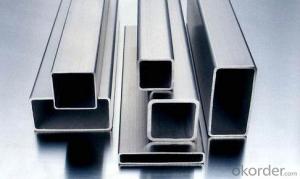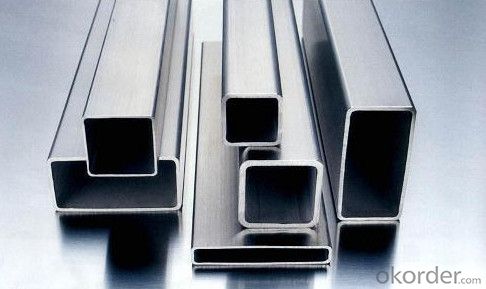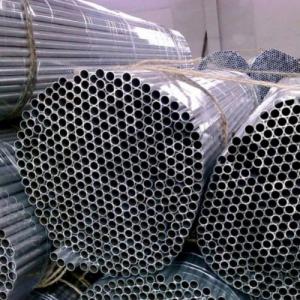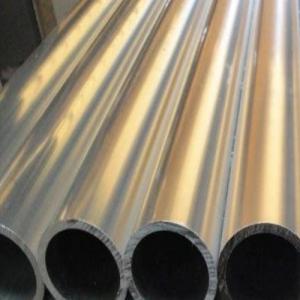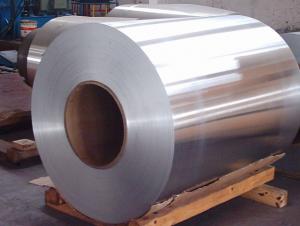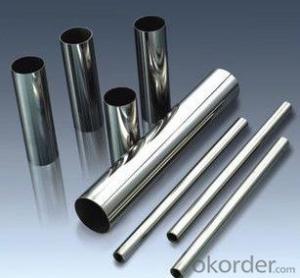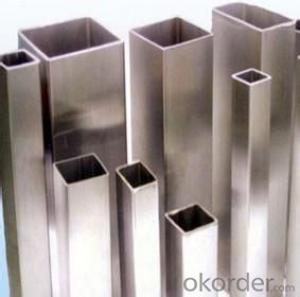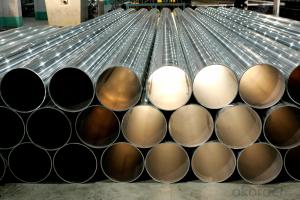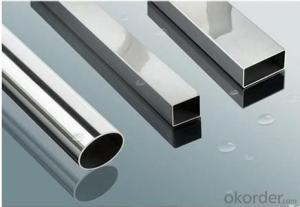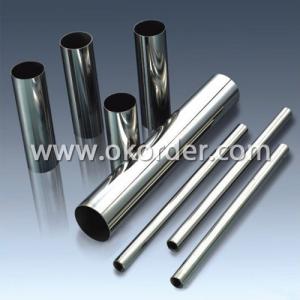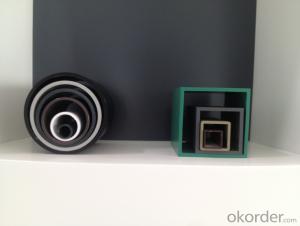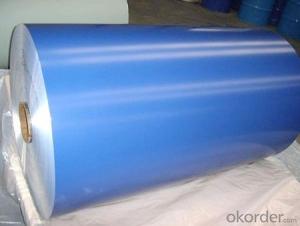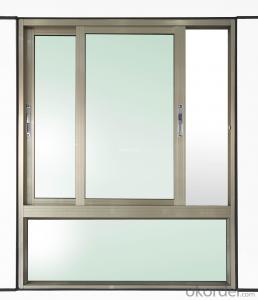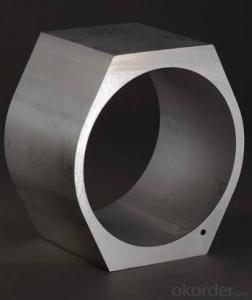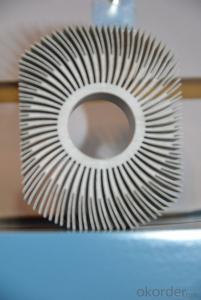Aluminum Pipes - Aluminium Square Pipe AA7075
- Loading Port:
- China Main Port
- Payment Terms:
- TT OR LC
- Min Order Qty:
- -
- Supply Capability:
- -
OKorder Service Pledge
OKorder Financial Service
You Might Also Like
Aluminum alloy | 6063,6061,6005,6082,7075,1050etc |
Temper | T3-T8 |
shape | square, round, flat, angle ,etc |
surface | Anodizing ,Powder coating, Electrophoresis, etc |
Deep processing ability | Drill hole ,stretch bending, milling, welding, fabrication, etc |
Usage | Windows & door , LED panel, heat sink , curtain wall , solar Panel Frame, rail & fence , ladder ,etc. |
MOQ | 1Ton |
Packing | According to your requirement ,such as shrink wrap, plastic bag, kraft paper ,etc. |
Delivery | 15-20days after sample confirmed & down payment. |
Loading port | Quanzhou, Xiamen |
Shipping term | EXW,FOB,CFR,CIF |
Payment term | T/T,30% advanced deposit, the balance paid off before loading, or consulting |
Moulds | 1,Using our moulds ,no fee |
2,Using customer drawing, opening mould, usually over 4tons then the moulds fee can be refunded | |
3,Mould cost is negotiable base on the order quantity |
- Q: Six meters long, three hundred and sixty-five round, ten cm thick, aluminum pipe useful to do?
- Pipe is widely used. Pipes are used in many industries.Different industries have different characteristics of the industry, and thus have different technical requirements.Pipe is a relatively mature product, each industry has the corresponding technical standards.Detect pipe material, according to the application of pipe industry, select the corresponding product standards, according to the industry needs to detect the corresponding technical indicators.
- Q: What's the difference between an air conditioned pure copper tube and an aluminum tube?
- For users, the difference is modest. If you need to use only intermediate machine, air conditioning copper connecting pipe than aluminum connecting pipe to some reliable air conditioning. The air-conditioner doesn't make any difference.
- Q: What are the limitations on pipe lengths for aluminum pipes?
- The limitations on pipe lengths for aluminum pipes can vary depending on several factors. One primary consideration is the diameter of the pipe. Generally, larger diameter aluminum pipes can handle longer lengths due to their increased strength and rigidity. Another important factor to consider is the intended application of the pipe. Aluminum pipes used for transporting fluids or gases under pressure may have limitations on their length to ensure optimal performance and safety. These limitations can be influenced by factors such as the maximum allowable pressure, temperature, and the material being transported. Additionally, the method of installation and support for the aluminum pipe can play a role in determining its maximum length. Longer pipe lengths may require additional supports or reinforcement to prevent sagging or excessive stress on the pipe. It is also essential to consider the manufacturing standards and guidelines provided by industry organizations such as the Aluminum Association or relevant codes and regulations. These standards often provide recommendations or limitations on pipe lengths based on the specific alloy and temper of the aluminum used. In summary, the limitations on pipe lengths for aluminum pipes depend on the diameter, intended application, installation method, and adherence to relevant industry standards. It is crucial to consult with industry professionals or refer to applicable guidelines to determine the appropriate length for a specific aluminum pipe.
- Q: Can aluminum pipes be used for cooling tower installations?
- Yes, aluminum pipes can be used for cooling tower installations. Aluminum is a lightweight, durable, and corrosion-resistant material, making it suitable for cooling tower applications. It offers excellent heat transfer properties and is commonly used in the construction of heat exchangers and cooling systems.
- Q: You say that the Internet has said plastic tubes, all sorts of strange things, in line to buy, no seal, the tube body is plastic, but some people say that the Internet is aluminum, hope someone can accurately answer what aluminum tube, which is plastic pipe. Is there a counter here?... High marks seek truthLZ where the city has wooden counters, can not go to the identification.. I've got a map on the Internet. I'm more like the one on the right
- A. Genuine tube with aluminum pull filiform, false feeling seems to simply do like aluminum plastic tube body.Second, the lid is not the same, the cover is genuine bright surface, false lid is frosted.Third, after opening, paste is not the same, authentic paste is paste like.
- Q: Are aluminum pipes suitable for paper mills?
- Certainly, aluminum pipes demonstrate suitability for paper mills. Renowned for their exceptional resistance to corrosion, aluminum pipes offer significant advantages in paper mills where chemicals and moisture are present. Moreover, their lightweight nature simplifies handling and installation, thereby reducing labor expenses. Additionally, their commendable thermal conductivity facilitates efficient heat transfer across diverse paper mill procedures. Furthermore, aluminum pipes can be effortlessly fabricated and tailored to meet precise specifications, ensuring seamless integration with the paper mill's infrastructure. In conclusion, aluminum pipes deliver durability, adaptability, and economic feasibility, rendering them an appropriate selection for paper mills.
- Q: Can aluminum pipes be used for water treatment filters?
- Yes, aluminum pipes can be used for water treatment filters. Aluminum is a durable material that is resistant to corrosion, making it suitable for use in water treatment systems. Additionally, aluminum pipes can be easily fabricated and have good heat conductivity, making them an efficient choice for water treatment filters.
- Q: What are the different types of aluminum pipes available?
- There are several different types of aluminum pipes available for various applications. 1. Seamless Aluminum Pipes: These pipes are manufactured without any weld or seam. They are highly durable and can withstand high pressure and temperature. Seamless aluminum pipes are commonly used in aerospace, automotive, and marine industries. 2. Welded Aluminum Pipes: These pipes are formed by welding two or more pieces of aluminum together. They are cost-effective and suitable for applications that don't require as much strength as seamless pipes. Welded aluminum pipes are commonly used in construction, irrigation, and HVAC systems. 3. Extruded Aluminum Pipes: These pipes are formed by pushing heated aluminum billets through a shaped die, resulting in a continuous length of pipe with a constant cross-section. Extruded aluminum pipes are lightweight, corrosion-resistant, and have excellent thermal conductivity. They are widely used in the construction, automotive, and electrical industries. 4. Drawn Aluminum Pipes: These pipes are produced by drawing an extruded aluminum tube through a die to reduce its diameter and increase its length. Drawn aluminum pipes have improved surface finish and tighter tolerances compared to extruded pipes. They are commonly used in the manufacturing of furniture, lighting fixtures, and heat exchangers. 5. Aluminum Alloy Pipes: These pipes are made from aluminum alloys, which are mixtures of aluminum with other elements such as copper, magnesium, or zinc. Aluminum alloys enhance the strength, corrosion resistance, and other properties of the pipes. They are used in a wide range of applications, including aerospace, automotive, and structural engineering. It is important to consider the specific requirements of your project or application when choosing the type of aluminum pipe. Factors such as pressure rating, temperature resistance, corrosion resistance, and cost should be taken into account to ensure the most suitable option is selected.
- Q: How do aluminum pipes perform in high-temperature environments?
- Aluminum pipes generally perform well in high-temperature environments due to their excellent thermal conductivity and resistance to corrosion. Aluminum has a melting point of 660 degrees Celsius (1220 degrees Fahrenheit), which is higher than many other metals commonly used in piping systems. In high-temperature environments, aluminum pipes effectively dissipate heat, preventing the accumulation of excessive heat that could potentially damage the pipes or the surrounding area. Their high thermal conductivity allows for efficient heat transfer, which is particularly beneficial in applications where heat needs to be transferred from one point to another. Furthermore, aluminum pipes have a low coefficient of thermal expansion, meaning they expand and contract less than other materials when exposed to high temperatures. This characteristic helps minimize the risk of pipe distortion or leakage due to thermal stress, ensuring the integrity of the piping system. Another advantage of aluminum pipes in high-temperature environments is their resistance to corrosion. Aluminum naturally forms a protective oxide layer on its surface, which prevents further oxidation and corrosion even at elevated temperatures. This protective layer acts as a barrier against the corrosive effects of high heat and chemicals, making aluminum pipes suitable for various industrial applications. However, it is important to note that the specific performance of aluminum pipes in high-temperature environments may depend on factors such as the alloy composition, wall thickness, and the presence of any protective coatings. It is recommended to consult with experts or engineers to determine the appropriate type and specifications of aluminum pipes for specific high-temperature applications.
- Q: Are aluminum pipes suitable for outdoor use?
- Yes, aluminum pipes are suitable for outdoor use. Aluminum is a highly durable and corrosion-resistant material, making it ideal for various outdoor applications, including pipes. It can withstand harsh weather conditions, such as rain, snow, and sunlight, without rusting or deteriorating. Additionally, aluminum pipes are lightweight, which makes them easy to handle and install in outdoor settings.
Send your message to us
Aluminum Pipes - Aluminium Square Pipe AA7075
- Loading Port:
- China Main Port
- Payment Terms:
- TT OR LC
- Min Order Qty:
- -
- Supply Capability:
- -
OKorder Service Pledge
OKorder Financial Service
Similar products
Hot products
Hot Searches
Related keywords
